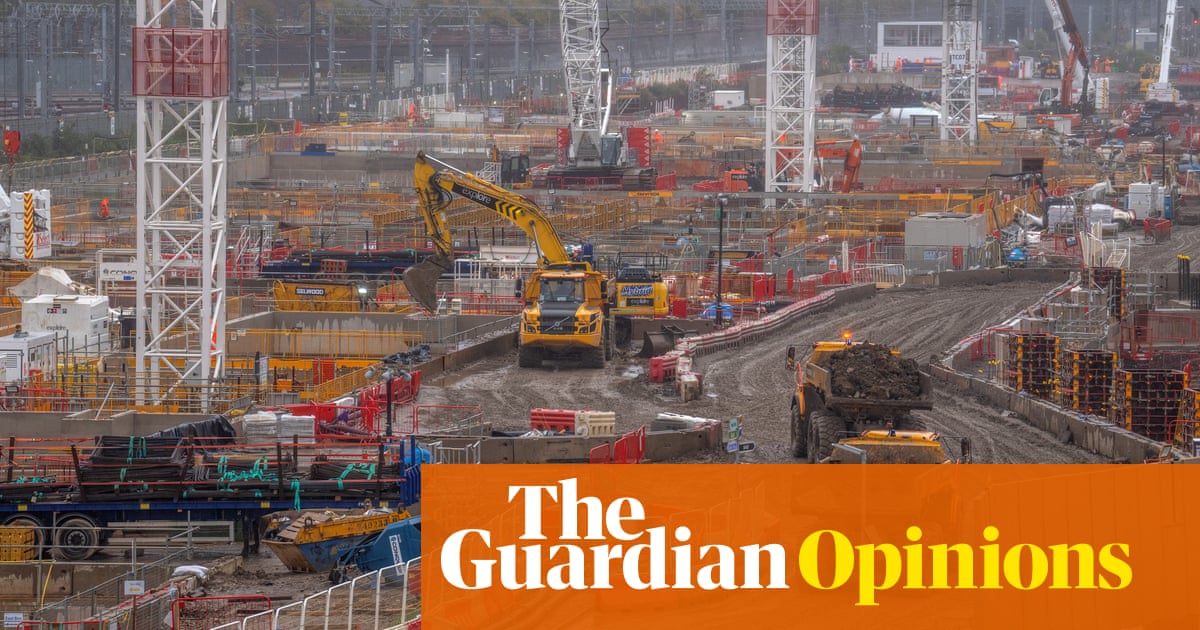
The most astonishing government document I have ever read sits on my desk. It is called Network North: Transforming British Transport and it purports to explain why Rishi Sunak cancelled half the HS2 project last month. In fact, it does not explain anything. It is an angry rant, tearing the entire HS2 project to bits: ridiculing, smashing and intellectually humiliating it.
The white paper is apparently an announcement of new transport projects in the north and elsewhere, perhaps meriting a transport department press release. Yet it is presented as from Downing Street with all the pomp of a peace plan for Ukraine. It rubbishes every argument made for HS2 over a decade, in identical terms to those made by its critics. It does so, most unusually for a government paper, under a picture of Rishi Sunak, with his personal foreword. But who was the proud parent of this £100bn monster mistake? None other than the man Sunak has just dragged out of retirement to be his foreign secretary, David Cameron. Is this political sadism?
Every part of HS2 is now trashed by Sunak. This includes its stress on speed, its cost, its governance and its value for money. Successive ministers and chancellors were cajoled into backing it by powerful lobbying and the thesis that it was “too big to cancel”. Critics of the scheme were deluged with complaints. Two senior officials even visited the Guardian offices after an article I wrote. Everything they said was rubbish, which is what Sunak’s document now admits.
Each chapter of the report abounds with damaging statistics. It says that only four out of 10 residents of Leeds can reach the city’s centre in under half an hour, while in like-sized Marseille the figure is nine out of 10. Sunak writes: “Buses are the most popular form of public transport … Yet for our biggest investment priority, taking up a third of the entire transport investment budget, we chose HS2: a scheme for long-distance rail journeys between a handful of cities and London.”
No less than 88% of all passenger miles are apparently clocked up on the road. Rail comprises less than a third even of public transport usage. Just 7% of the public thinks long-distance trains a priority. Business rail travel – one of the justifications for HS2 – has fallen since Covid. HS2 now could return “possibly as little as 80 pence for every £1 invested by the taxpayer. And the estimated benefits fall disproportionately on London and the south-east.”
In other words this is certainly no levelling up project. Yet Andy Burnham, the mayor of Greater Manchester, and Andy Street, the mayor of the West Midlands, have been its fiercest champions. They will now be receiving billions of pounds’ worth of investment in local transport as a result of the savings from scrapping HS2’s second leg. They should be cheering.
According to Sunak, building this railway is costing five times per mile what similar railways cost in Europe; indeed, 13 times the cost of the Paris-Strasbourg line. As for investment, he argues that we have been spending 23% more this year on HS2 than we spend on roads as a whole nationwide. “We have been getting [these] decisions wrong,” he states baldly.
In truth, Sunak’s document rubbishes HS2 as a concept from the start. But where was he during the evolution of all this? For the past three years he has been at the heart of government, effectively signing cheques to the tune of £150m a week to HS2. Evidence that cost estimates were wrong is now piling up. A recent Sunday Times investigation alleges that “senior managers [at HS2 Ltd] instructed staff to keep cost estimates artificially low”, based on testimony from whistleblowers who were reportedly sacked after raising concerns. HS2’s fraud unit is investigating these allegations and the company denies wrongdoing.
Where were the officials under Sunak’s command? They were prancing up and down tunnels being photographed in hard hats. Now, after years of extravagance, Sunak can blandly state as a fact that, of all the north’s transport needs, the one “that least needs fixing [is a] fast train to the capital … [where] almost half the economic benefits go to London and the south-east.” The enormous sums involved “could be far better spent”. Quite so.
The only thing in this paper I cannot understand is why, after so demolishing HS2 as a concept, Sunak did not stop it and give the huge savings to the NHS. Just last month, it was reported that the cost of the surviving line to Birmingham had risen by a fifth in just four months to £68bn in today’s prices. This is inexcusable. Even the transport department’s top civil servant, Bernadette Kelly, admitted to a House of Commons committee around the same time that it “would represent poor value for money”. Why go on, when you have made such a convincing case for stopping? The line is three years under way, but you could save a further eight mind-blowing years to completion. This would vastly benefit projects like those already announced for elsewhere.
The answer can only be lack of political guts. That is indicated by Sunak’s additional decision that the new Euston station – now a huge building site – will still go ahead. He says he can shrink its costs by an implausible £6.5bn and get the private sector to pay for the rest. He cited Battersea power station, the most over-developed site in London, or Canary Wharf. I cannot imagine anyone would seriously want to build another Canary Wharf looming over Bloomsbury and Regent’s Park. There cannot be anywhere in Britain less in need of public investment.
Alexander Jan, an economist and expert on rail property formerly with Arup, told the FT this was an “absurd proposition”. Battersea delivered barely £1bn in private finance. To proceed with HS2 free of public cost would need “the equivalent of 21 Canary Wharf towers – plus 80,000 homes – to come up with that sort of money”. On present plans, Sunak would be lucky to see £500m. This was launched as the greatest ever boost to the economy of the north. For it to end with a second Canary Wharf in central London would be an outrage.
If the existing phase of HS2 proceeds it should clearly stop at the Elizabeth Line at Old Oak Common. This is intended to be the Canary Wharf of west London. HS2 would at least give a boost where one is welcome. Labour’s Keir Starmer, who has been pathetically weak on HS2, should immediately announce that, if he will not do the right thing and cancel HS2, he will at least stop it at Old Oak Common. It would be the one sensible decision in this whole fiasco.
Simon Jenkins is a Guardian columnist












